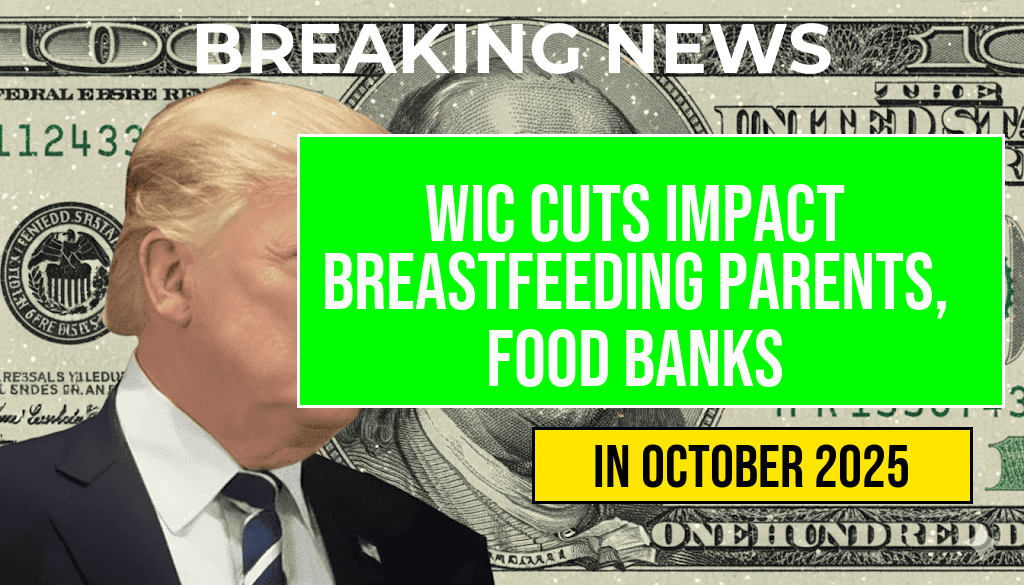Breastfeeding parents in the United States are facing a $52 monthly reduction in nutritional support as the Women, Infants, and Children (WIC) program pauses its benefits. This decision has raised concerns among health officials and advocates, who fear that the cut will significantly impact families already struggling to meet their nutritional needs. Food banks across the nation are bracing for an increased demand as they prepare to support these parents and their children during this challenging period. With many families relying on WIC for essential food items, the pause in funding could exacerbate food insecurity for vulnerable populations.
WIC Program Overview and Recent Changes
The Women, Infants, and Children (WIC) program is a federal assistance initiative designed to provide nutritional support to low-income pregnant women, new mothers, and young children. The program aims to improve health outcomes for mothers and their children by offering access to healthy foods, nutrition education, and healthcare referrals. Typically, WIC participants receive monthly food packages, which currently include a variety of healthy options such as fruits, vegetables, whole grains, and infant formula.
However, as of this month, a decision has been made to pause certain benefits, leading to a $52 monthly cut for breastfeeding parents. The pause is reportedly a temporary measure, yet details surrounding the duration and specific reasons for this decision remain unclear. As WIC benefits are crucial for many families, the implications of this cut are already being felt.
Impact on Families and Food Banks
The reduction in WIC benefits comes at a time when many families are already facing financial challenges due to rising food prices and inflation. Parents who rely on the program are expressing concern about how they will afford nutritious food for their babies. With the cut affecting breastfeeding parents, there are worries about the long-term health implications for both mothers and infants.
- Nutrition insecurity: Parents are likely to struggle to provide adequate nutrition for their children, potentially affecting their growth and development.
- Increased reliance on food banks: Many families may turn to local food banks for assistance, leading to increased demand for their services.
- Stress and mental health: The financial strain of reduced support can lead to heightened stress and anxiety among parents, impacting overall family well-being.
Food Banks Prepare for Increased Demand
As the pause in WIC benefits takes effect, food banks are gearing up for an anticipated surge in requests for assistance. Many organizations are mobilizing resources to ensure they can meet the needs of families affected by the cuts. This includes expanding food offerings, increasing outreach efforts, and collaborating with local health departments and community organizations.
According to the Feeding America network, food banks across the country are already experiencing higher demand due to economic conditions. They are urging community members to contribute food and funds to help mitigate the impact of the WIC benefit cuts. Local food banks are also working to provide information on alternative resources available to families in need.
| Month | Estimated Increase in Requests (%) |
|---|---|
| October | 20% |
| November | 30% |
| December | 25% |
Community Response and Advocacy
Community leaders and health advocates are voicing their concerns regarding the WIC program’s decision. Many are calling for immediate action to restore benefits, emphasizing the vital role these resources play in ensuring the health and well-being of mothers and their children. Grassroots organizations are mobilizing to advocate for policy changes that would prevent future cuts to essential programs like WIC.
Health experts are also stressing the importance of maintaining access to nutritious foods for breastfeeding parents. Nutritionists argue that every family deserves the support necessary to provide a healthy start for their children. They point out that cutting benefits during critical developmental stages can have lasting repercussions on children’s health.
Looking Ahead
As the situation unfolds, it remains to be seen how long the WIC program will maintain its pause on benefits and what measures will be taken to support families impacted by the cuts. Advocacy efforts are expected to increase in the coming weeks as communities rally together to demand the restoration of necessary resources. The health and well-being of families across the country depend on the collective response to this pressing issue.
For more information on the WIC program and its benefits, visit the USDA Food and Nutrition Service.
Frequently Asked Questions
What is the reason for the $52 monthly cut for breastfeeding parents?
The $52 monthly cut for breastfeeding parents is due to a temporary pause in the WIC program, which provides assistance to families in need, particularly during critical periods of nutrition for infants and young children.
How will this cut affect breastfeeding parents?
This cut will place additional financial strain on breastfeeding parents, as they rely on the WIC program for essential food and nutritional support. The reduction may hinder their ability to access necessary supplies and maintain a healthy diet.
What are food banks doing to prepare for the impact of the WIC program pause?
Food banks are proactively preparing for the impact of the WIC program pause by increasing their stock of nutritional foods and resources geared towards supporting families affected by the cut.
Are there alternative resources available for breastfeeding parents during this time?
Yes, breastfeeding parents can seek assistance from local food banks, community organizations, and other support programs that may offer resources and education to help alleviate the impact of the WIC cut.
What can communities do to support breastfeeding parents facing financial challenges?
Communities can support breastfeeding parents by donating to food banks, organizing fundraising events, and advocating for policies that protect and enhance support programs like the WIC program to ensure families have access to nutritious food.






